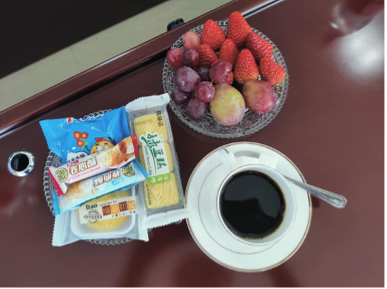
Slovenians in China and their language preferences
06 Jan 2025
0
Slovenians in China work in globalised multilingual environments, whether in business, education, culture, sports or other activities. In April 2024, a one-month hosting visit to Xi'an Jiaotong-Liverpool University, Suzhou was carried out. For the purpose of project PoPMeD-SuSDeV (Horizon Europe, Marie Skłodovska-Curie, grant no. 101086139) five researchers of ZRC SAZU from three different institutes (Martina Bofulin, Maja Gostič, Marijanca Ajša Vižintin, Slovenian Migration Institute, Nataša Gregorič Bon, Institute of Anthropological and Spatial Studies, Miha Kozorog, The Institute of Slovenian Ethnology) conducted anonymous narrative interviews with Slovenians (and some others) working in living in Suzhou, Hangzhou, Shanghai and Beijing.

We met in the companies where they work, in public spaces such as restaurants or parks, or in their homes, depending on where they invited us. We travelled from Suzhou to Beijing by train, travelling at 350 km/h and taking just 4 hours and 20 minutes to cover the 1,200 km.

Some sub-questions focused on the plurilingual reality of the participants. We wanted to know in which language(s) they live their family life, with whom they socialize in their free time, and how their professional environment influences their choice of language(s). Having spoken to Slovenians in China, we can say that the choice of home language depends mainly on their partners: if the partners are also from Slovenia, their home language is Slovenian. If their partner is Chinese, they often speak English at home, but they have also learned Chinese and speak Chinese when they meet Chinese family members. Having a Slovenian or Chinese partner is also crucial for their socialisation: if their partner is Slovenian, they get together with other Slovenians a few times a year in their free time and speak Slovenian on these occasions (Slovenian picnic, football matches, sailing, cultural events). Sometimes they also socialize and do sports activities with friends from China or other countries, mostly speaking English. Unless their partner is Chinese, few of them have learned to speak Chinese, even if they have lived in China for five or ten years. However, children are learning Chinese. They mostly attend international schools where English is the language of instruction, but they also learn Chinese.

Their professional environment strongly influences their choice of language at work; in most cases, they speak English at work with their Chinese colleagues. Some of them, in their free time and at work, hang out with people who have moved to China from other successor countries of the former Yugoslavia and consequently speak also Croatian/Serbian/Bosnian. If they work for a Slovenian company and are in regular contact with its representatives via mobile phones or online meetings, they naturally speak to them in Slovenian.

Partial results of the research were presented at an international conference and the abstract of the conference presentation has been published:
VIŽINTIN, Marijanca Ajša. Jezikovne preference Slovencev na Kitajskem = Preferenze linguistiche degli Sloveni in Cina = Language preferences of Slovenians in China. V: ROLIH, Maša (ur.), MIKOLIČ, Vesna (ur.). Jeziki sožitja, jeziki konflikta : mednarodna konferenca : ob 30-letnici ZRS Koper, 50-letnici SLORI Trst in skorajšnji 100-letnici INV : Koper, 6.-8. junij 2024 : program in povzetki = Lingue di coesistenza, lingue di conflitto : conferenza internazionale : 30° anniversario di ZRS Koper, 50° anniversario di SLORI Trieste e il prossimo 100° anniversario di INV : Koper, 6-8 giugno 2024 : programma e sintesi = Languages of Coexistence, Languages of Conflict : International Conference : 30th anniversary of ZRS Koper, 50th anniversary of SLORI Trieste and the forthcoming 100th anniversary of INV : Koper, June 6-8, 2024 : programme and abstracts. Spletna izd. Koper: Znanstveno-raziskovalno središče Koper, Annales ZRS: = Centro di ricerche scientifiche Capodistria, Annales ZRS: = Science and Research Centre Koper, Annales ZRS, 2024. Str. 81-83. https://www.zrs-kp.si/wp-content/uploads/2024/06/Zbornik-povzetkov_JEZIKI-SOZITJA_spletna-izdaja-1.pdf.
In the future, when we have a detailed analysis of the narrative interviews, we will be able to provide more information about the language choices of Slovenians living and working in China.
Photos and text by Marijanca Ajša Vižintin, 2024, Slovenian Migration Institute ZRC SAZU
